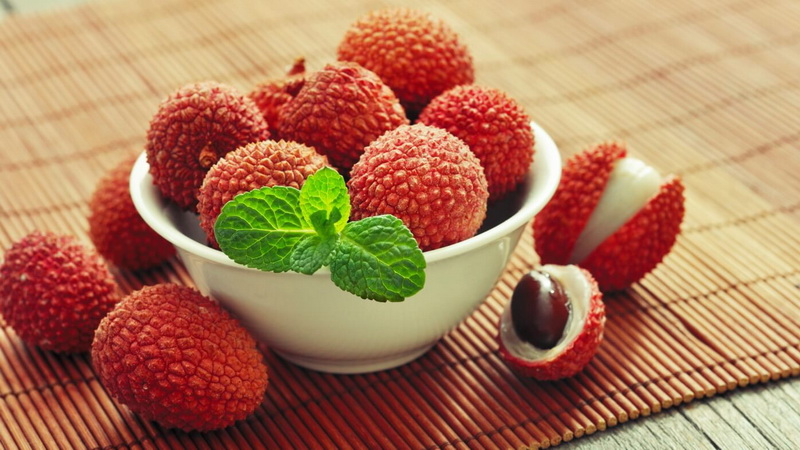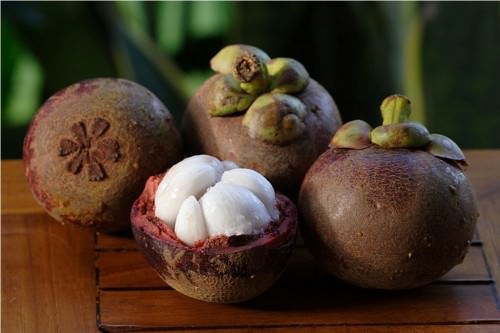18 Useful and Interesting Facts About Lychee or Chinese Plum
by Editorial Staff
Lychee is a tropical fruit native to the lowlands of China, Taiwan, Australia, and Southeast Asia and is found in abundance during the summer seasons. The bright and beautiful fruits grow on a medium-sized evergreen tree with a rounded, slightly oblong shape. Lychee fruits are also called foxes, Chinese plum, litchi, and liji.
Interesting Facts About Lychee

The tree, in the period of fruiting, has a stunning sight, on which attractive balls with a slightly tart pulp and taste of grape are hung. The outer surface of the Chinese plum is covered with a rough texture, with a slightly peelable red skin. The inside of the fruit consists of white, sweet, and juicy pulp, inside which there is a dark large seed.
- These royal fruits contain many nutrients and valuable substances that are so important for human health. Ligi contains a high dose of vitamin C, which exceeds the amount of its content than oranges and lemons. The commonwealth also contains vitamin D, B-9, and PP. And, the fiber in 100 grams, as much as the apple contains along with the peel.
- Minerals contain magnesium, copper, zinc, iron, and manganese, which are essential for blood circulation and the formation of red blood cells (erythrocytes).
- Also, the nicotinic acid present in the fruit expands blood vessels and increases their elasticity. Besides, it is full of vegetable protein.
- The fruit is low in calories, contains no saturated fat or cholesterol, but is rich in dietary fiber, which is very important for people who are worried about being overweight.
- Chinese plums contain various phytochemicals, such as flavonoids, polyphenols, vitamin C, and proanthocyanins, which can neutralize the growth of free radicals and protect the body from serious ailments and cancer.
- In traditional Chinese medicine, the lychee is considered a "warm" element that helps nourish the blood and warm the body.
- It is believed that lychees are a natural aphrodisiac, in India, it is even called the fruit of love.
- Remember! Along with the beneficial properties, lychees can be harmful. Unripe fruits contain natural toxins that can lead to hypoglycemia, which causes fever and seizures. Foods that are consumed in excess are at an increased risk of sores and acne.
- Before eating lychee, you should first peel them. The skin of these exotic fruits is about as soft as that of oranges. You need to start peeling from the very top, and the rest of the skin should come off easily. It should be thrown away or used later (when drying and grinding) to flavor tea.
- There is a brown bone inside the pulp, which must be removed and disposed of, as it contains toxic substances, and the light pulp should be eaten raw. You can also add ripe lychee to a fruit salad or make a sweet sauce to accompany savory dishes.
- Get creative with making sweet syrup and then serving it in cocktails, custards, ice cream, sorbet, pancakes, or to flavor sweet summer teas. Chinese plum goes well with oatmeal, complements a cheese or fruit plate. Freezing, drying, and various canning methods can be applied to this delicacy.
- Fresh wolfberry is available from June to October. The fruit fully ripens on the tree itself and no longer ripens after harvest. When buying a hero from the tropics, choose fruits of bright color, from light red to dark red color and without spots. Their skin should be tough and leathery, but supple, and at the same time, not dull, dry, or too dark. The inner flesh should be fresh and free from cuts and mold. If the fruit tastes bitter or sour, it means that it is not fully ripe.
- When sold, sellers on the sales floor should lay out these fruits in the open state in small quantities and replenish the stock only when it is minimal, to ensure their constant quality.
- Keep in mind that lychees will discolor in just a couple of hours if left in an air-conditioned store as dehydration makes them brown. The fruit may look bad, but the sales staff are obliged to educate consumers that the quality of the product is not affected by the incoming airflow.
- It's no secret that Australian lychees are the freshest and finest in the world. Australian producers do not use sulfur dioxide to preserve skin color, so they are always fresh, sweet, juicy, and natural-looking. Australia has a longer lychee season and has been available fresh for longer than other countries.
- Proper storage and handling of lychee is the key to increasing sales and offering consumers the best fruit possible. The fruit has a good shelf life and can be stored at room temperature for up to 5 days and kept in the refrigerator for up to five weeks.
- To avoid moisture loss, keep the room humidity at 90-98%. To prevent discoloration from red to brown and to avoid moisture loss, wrap in a paper towel and store in a perforated plastic bag.
- Important! Lychees must be peeled before serving, as they quickly change color and quickly deteriorate.
 Also Like
Also Like

8 Interesting Facts About Chinese Сabbage
Peking cabbage appeared on the shelves relatively recently but quickly gained popularity. Thanks to its delicate taste, it even “bypassed” the usual white cabbage. Salads are made from it, soups are cooked, cabbage rolls and other dishes are made. But in ...

14 Interesting Facts About Cherry Plum
The well-known name for cherry plum is a wild plum. It is impossible to establish exactly how this plant appeared in our country, but presumably, it was brought from Greece or Armenia, where it has been grown for several thousand years. One way or another...

Perhaps it is difficult to find a person on Earth who has not had a chance to taste bananas. It was once upon a time that they were exotic from distant lands, but now they can be bought in stores almost anywhere, even in the cities farthest from the equat...

10 Interesting Facts About Arugulas
Indau, eruka, rocket, sowing caterpillar – this plant has many names, but whatever you call it less useful for health, it does not become from this. Arugula has a pleasantly bitter flavor that can add a spicy taste to any dish. Many who have tried it once...

10 Interesting Facts About Asparagus
All over the world, spring is considered the season of asparagus, when the first young juicy shoots appear from the ground. In our country, you don’t even have to look for local asparagus in the markets – you need to grow it (and it doesn’t grow in one ye...

10 Interesting Facts About Broccoli
There is more vitamin C in broccoli cabbage than in lemon, A – almost as much as in carrots, and the rest of the trace elements are certainly not less than in related vegetables of the cabbage family. It should be treated with caution by those who have in...

10 Interesting Facts About Cauliflowers
Cauliflower is superior to all other varieties in taste and nutritional content. What do you know about Cauliflowers? We will tell you 10 interesting facts about him, and if you have something to add, be sure to leave your comment under this post! Caulifl...

10 Interesting Facts About Dills
Many people actively use dill when preparing a wide variety of dishes; this seasoning is considered truly universal. What do you know about Dills? We will tell you 10 interesting facts about him, and if you have something to add, be sure to leave your com...

10 Interesting Facts About Fennels
Not the most frequent guest in our kitchens, but his every appearance should be noted. What do you know about Fennels? We will tell you 10 interesting facts about him, and if you have something to add, be sure to leave your comment under this post! The ho...

10 Interesting Facts About Garlic
Many doctors recommend eating garlic, in the absence of contraindications, of course. This is an extremely useful product, notable for the fact that when cooked or dried, it retains a significant proportion of useful substances. What do you know about Gar...

10 Interesting Facts About Greens
We know vegetables and greens are good for you. But what exactly is their strength and why are they so important in the daily diet? After examining the opinions of people leading a healthy lifestyle, we are a selection of 10 interesting facts. What do you...

10 Interesting Facts About Lettuce
Lettuce is known all over the world and has been actively used since the 20th century. People can grow lettuce on their own to consume its leaves or stump. It should be noted that lettuce varieties such as Roman are produced mainly in Europe (in the Medit...

10 Interesting Facts About Parsley
Even the usual seasoning can harbor a lot of unusual things. What do you know about Parsley? We will tell you 10 interesting facts about him, and if you have something to add, be sure to leave your comment under this post! Did you know that there are curl...

10 Interesting Facts About Pumpkins
Orange, juicy, bright, tasty, useful! Pumpkin is a real symbol of autumn. And what do you know about pumpkins? We will tell you 10 interesting facts about pumpkins, and if you have something to add, be sure to leave a comment under this post! In fact, the...

12 Interesting Facts About Daikon
Due to the high content of vitamins, daikon strengthens the immune system, and its phytoncides kill microbes. Daikon removes excess fluid from the body, cleanses the liver and kidneys, stimulates the stomach and intestines, and is even able to dissolve ga...

12 Interesting Facts About Mangosteen
We have already written about dragon fruit – one of the most popular fruits in Southeast Asia, especially in Thailand. We decided to continue the series of notes dedicated to fruits, which can be seen in abundance on Thai food stalls. The turn of mangoste...

12 Interesting Facts About Mustard
Mustard is an annual plant that grows up to 60 cm in height. The bright yellow flowers form seed pods, each containing about 6 seeds. What do you know about Mustard? We will tell you 12 interesting facts about him, and if you have something to add, be sur...

13 Interesting Facts About Beans
Many dishes contain beans, and in some countries, they are an integral part of the national cuisine, for example, in Mexico. What do you know about Beans? We will tell you 13 interesting facts about him, and if you have something to add, be sure to leave ...

14 Interesting Facts About Basil
Basil is considered an Indian spice and is used as a condiment in many cuisines around the world. What do you know about basil? We will tell you 14 interesting facts about him, and if you have something to add, be sure to leave your comment under this pos...

14 Interesting Facts About Potatoes
Potatoes are part of the usual diet for most of us, and we eat it almost every day, without much thinking about what it is. The number of dishes that include potatoes is infinitely huge, and it is difficult to overestimate the benefits that this root vege...
Comments for "18 Useful and Interesting Facts About Lychee or Chinese Plum"
 |
 |
 |
 |
Best Food Ideas
Get FREE Recipe Gifts now. Or latest free cooktops from our best collections.
Disable Ad block to get all the secrets. Once done, hit any button below
 |
 |
 |
 |